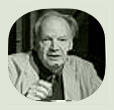
Odo Marquard (1928), currently professor emeritus at the University of Giessen and member of the Academy of Language and Poetry in Darmstadt, is one of the most lucid and irreverent thinkers of the "skeptical generation". Having suffered in childhood imprisonment in a Nazi boarding and a brief experience as a teenager captive soldier, intellectually Marquard began to form immediately after the war; studied from 1947-1954 philosophy, German studies and theology in Münster and Freiburg under the direction of his main teacher Joachim Ritter and his Ph.D. in 1954 with a job that would become his debut: Method skeptical regarding Kant (1958).
In 1963 it was fitted with an investigation that attempted to show how psychoanalysis represented the continuation of German idealism disillusioned by media and published years later under the title of transcendental idealism, romantic nature philosophy, psychoanalysis (1987). His pieces of "transcendental literature" have earned him recognition as the Sigmund Freud Award for scientific prose (1984) Ernst Robert Curtius or Award (1996) by the set of his essays.
His works include: Difficulties with the philosophy of history (1973), Farewell to the principles (1981), contingent Apology (1986), Aesthetics and anestética (1989), Happiness in unhappiness (1995) and Philosophy the compensation (2000). And its most recent contributions (Skepticism as a philosophy of finitude and Guy and separation of powers, appeared in 2002 and 2004 respectively) confirm how the brevity of life incites doubt everything fundamentalism and weave a thousand and one stories to address the threat of death.




